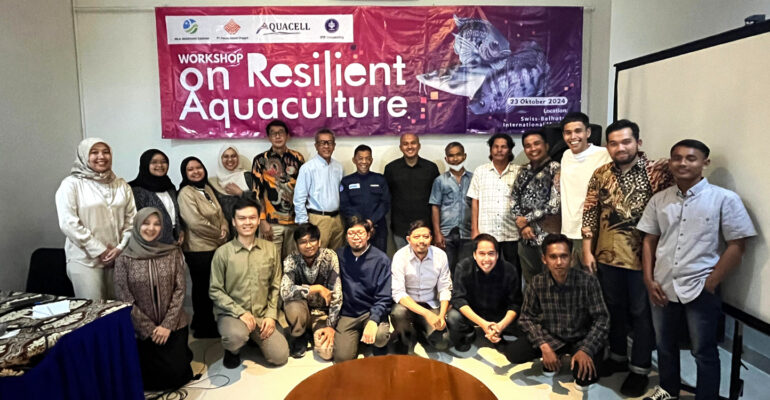IPB University’s BDP Department Improves Knowledge of Lake Toba Fish Farmers

Department of Aquaculture (BDP), Faculty of Fisheries and Marine Sciences (FPIK) IPB University held a Workshop and Stadium Generale on Resilient Aquaculture at Swiss-Belinn Gajah Mada Hotel, Medan, South Sumatra. This activity is part of the activities of the Inter-University Centre of Excellence (PUAPT) in collaboration with the Tilapia Breeding Center (NBC). At this workshop, fish farmers in Lake Toba were also present.
Benizar Husni, SH, LLM as the manager of NBC explained the background of the Sumatera Eye Centre (SMEC) Group. Apart from focusing on businesses in the health sector, SMEC also forms several businesses outside the health sector such as agriculture, skincare, food and others.
“Thank you to all the speakers for the knowledge delivered. Hopefully, activities like this can be held regularly and if possible, research can be done together,” he said.
Dean of FPIK IPB University, Prof Fredinan Yulianda hopes that workshops like this can advance the world of aquaculture, especially in tilapia commodities. “Hopefully, IPB University can become a role model for other universities to hold workshops related to fish farming from upstream to downstream,” he said.
Prof Muhammad Agus Suprayudi explained, in this workshop three main components of aquaculture will be reviewed that can be used as determining factors, namely seeds, diseases, and cost production or feed. He hopes that with this workshop, the problems that arise can be overcome.
One of the speakers, Dr Goshi Kato, explained that the biggest loss in aquaculture factors is caused by diseases. He said the use of vaccines can reduce the level of damage and reduce the use of antibiotics.
“Gamma-irradiated vaccines can be used for protein and membrane degeneration. Thus, there is no metabolic activity so it can be used to induce humoral immunity,” he said.
Meanwhile, Fajar Maulana, SPi, MSi, one of the IPB University lecturers, explained that the parent selection method is relatively simple and can be done during production. The best parent candidates are taken 5-10 per cent each and spawned again will produce good puppies.
Another speaker, Dr Hasan Nasrullah, explained about investing in aquaculture resilience through feed additives. The transformation of feed into good feed can be achieved with the use of feed additives. He said there are four factors of good feed, namely good for environment, good for fish, good for business and good for consumers.
On that occasion, Prof Dedi Jusadi explained the four determinants of fish production, namely feed, disease, water quality, and fish. Compensatory growth or feed compensation can be used for certain needs. “The rate of emptying the fish stomach to maximise the fish’s hunger point. When the feeding is normalised, the growth will accelerate,” he explained. (*/Rz) (IAAS/RSL)



